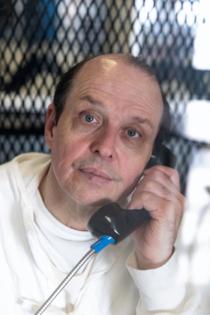Editorial: Robert Roberson death penalty case in Texas has turned into a horrific circus
Published in Op Eds
Robert Roberson’s death sentence has become a circus, with gruesome acts playing simultaneously in three distinctly American rings. In the center are Texas politicians battling one another for power to end or preserve Roberson’s life. In a side ring, celebrities weigh in on whether the condemned man might be telling the truth about his young daughter’s death, and in another, medical experts debate the credibility of shaken baby syndrome and the meaning of the autism spectrum.
It has the feeling of an 18th century public hanging, complete with gawking crowds. And yes, news outlets offering commentary. We’re all players in the most horrific show on Earth. All because of the death penalty.
That’s no knock on the members, Republican and Democrat, of the Texas House Criminal Jurisprudence Committee who effectively halted Roberson’s scheduled Oct. 17 execution with a last-minute subpoena for him to testify about his case. It was an odd yet creative and heroic move, blocking the killing at least temporarily, and forcing debate over the Texas laws and procedures that led to Roberson’s 2003 conviction and death sentence for supposedly murdering his 2-year-old daughter, Nikki Curtis. At trial, prosecutors presented medical testimony that the girl’s injuries could only be the result of “shaken baby syndrome,” in which a young child is injured or dies from blunt force trauma induced by abuse.
Roberson would be the first person to be executed based on the diagnosis just as it is falling into disrepute.
In advance of Monday’s hearing, Roberson’s life became the subject of a horrendous political tug-of-war. Attorney General Ken Paxton denied the lawmakers’ attempt to bring Roberson to the state Capitol. Gov. Greg Abbott told the Texas Supreme Court that the subpoena violated his executive purview. The court stayed the execution to resolve the elected officials’ territorial dispute.
In Texas’ unusual judicial system, the Supreme Court handles only civil matters. A second, co-equal high court — the Texas Court of Criminal Appeals — had previously denied Roberson’s request to postpone his execution, putting the two courts at odds. Each court has nine judges who run for office in partisan elections in which they align with political parties. All are Republican.
Complicating and politicizing matters further is that three of the Court of Criminal Appeals judges who rejected Roberson’s requests for a stay are lame ducks, having been defeated for reelection in the primary earlier this year after a campaign against them by Paxton’s political machine. The attorney general was unhappy that they had blocked him, two years earlier, from prosecuting several highly questionable voter fraud cases.
Voters are currently electing judges who could scrap the execution, or reschedule it.
Roberson’s position is nearly unimaginable. With his execution just hours away, he was called to Austin to argue for his life, not in court with experienced attorneys addressing judges or jurors on his behalf, but by himself, in front of politicians who would closely scrutinize his presentation.
Paxton blocked Roberson’s appearance at the hearing.
Roberson is autistic, which may make it difficult for him to understand the reactions and emotions of others. And vice versa. Even if he is not ultimately put to death, his punishment has been cruel and unusual as those words are commonly understood, if not as interpreted by courts that parse the meaning of the 8th Amendment. If he’s innocent, of course, the more than two decades he has spent in prison and the last year of entanglement in state political and ideological disputes is worse than cruel. It is a deep stain on the administration of justice.
Phil McGraw, also known as television’s Dr. Phil, testified on Roberson’s behalf in his absence. So did John Grisham, attorney, former member of the Mississippi House of Representatives and author of numerous legal thrillers that have been turned into popular films, including “The Pelican Brief,” “The Firm” and “The Rainmaker.” They argued that Roberson did not receive a fair trial and deserves a new one.
Involvement of celebrities adds to the circus-like atmosphere, yet McGraw and Grisham are, like the Texas lawmakers, heroes for sticking their necks out in pursuit of justice that they have good reason to believe was denied by the system.
McGraw noted that he does not oppose the death penalty.
“The death penalty hangs in the balance here because if we get this wrong in a case like this, I think the death penalty could come under real attack,” he said.
Yet the death penalty deserves to come under attack. Perhaps it’s ironic that imminent execution was the only thing that mobilized so many to come to Roberson’s defense. But that’s no credit to the death penalty. It’s instead a criticism of a legal system that concerns itself more with punishment and finality than with truth and fairness.
Nearly every developed and democratic nation has abolished the death penalty, except for Japan, Singapore, Taiwan — and the United States.
Even here, a majority of states have either abolished it or, as in the case of California, simply stopped executing people while leaving the punishment on the books.
Killing people, whether guilty or innocent, is an abuse of state power that should not be tolerated in a free and democratic society. Ending this circus means more than allowing Roberson to live for another few months. It means putting an end to the death penalty and recommitting ourselves to justice, mercy and truth.
©2024 Los Angeles Times. Visit at latimes.com. Distributed by Tribune Content Agency, LLC.




























































Comments